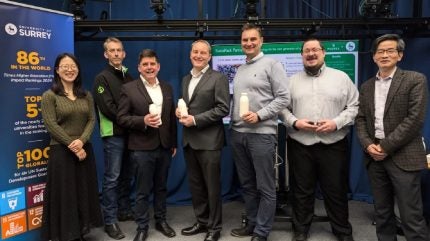
SustaPack, a multimillion-pound research initiative, has received a £1m ($1.2m) grant from the UK’s Engineering and Physical Sciences Research Council (EPSRC) to enhance the production of sustainable, paper-based packaging.
Pulpex, a packaging technology company, has partnered with the University of Surrey to advance its manufacturing processes for creating environmentally friendly bottles from natural wood fibres.
Pulpex CEO Scott Winston said: “We’re excited to strengthen our existing collaboration with the University of Surrey to enhance our technologies and processes.
“Our SustaPack partnership will help us advance safe, sustainable packaging solutions, enabling brand owners to meet net-zero targets.
“It gives consumers sustainable choices, delivers answers for brand owners and enables supply chains and retailers to deliver their carbon footprint reduction goals – a priority for all.”
The collaboration is part of a broader effort to address the manufacturing challenges associated with next-generation sustainable packaging for liquids.
The project, supported by the UK Research and Innovation co-investing programme, will focus on refining Pulpex’s patented technology.
This technology has already indicated degradable bottles that can be recycled within existing paper waste streams, offering an alternative to conventional plastic materials.
A critical aspect of this research is to improve the multilayered barrier coating of the packaging.
This coating is essential to prevent leaks and protect the quality of the contents by preventing oxygen permeation.
The team aims to develop more energy- and water-efficient processes for applying these coatings, which could also extend the shelf life of packaged goods.
The University of Surrey’s multidisciplinary team will investigate the use of thermal imaging and AI to detect and immediately correct defects in wet coatings.
This approach could lead to significant advancements in product quality by identifying and eliminating sources of imperfections.
By leveraging AI-driven computer vision techniques, the project aspires to achieve a 100% reliability rate in the production of sustainable packaging.
The potential outcomes of SustaPack could redefine industry standards for eco-friendly packaging, aiding brand owners in meeting stringent environmental regulations and offering consumers alternatives that combat plastic pollution.




